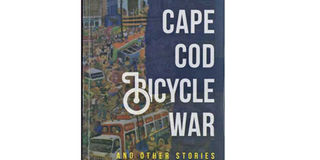Breaking News: KDF chopper crash kills five in West Pokot
Ex-Kwani editor Billy Kahora pens collection of short stories

The cover of The Cape Cod Bicycle War and other Stories by Billy Kahora. PHOTO | COURTESY
What you need to know:
- The book comprises 11 stories all exploring different challenges facing the youth in their transition to adulthood.
- The story is enriched with symbolism and the flood season is characterised as wartime between the Tsana (Tana River) and the Indian Ocean.
- The choice of characters’ names is equally poetic as Komora Kijana Wito is a grandson of Komora Mzee Wito.
Title: The Cape Cod Bicycle War and other Stories
Length 293 pages
Author: Billy Kahora
Publisher: Huza Press, Kigali
Reviewer: John Kibet
Nairobi city teems with a huge youth population; all looking for job and business opportunities. Indeed, the famed green city in the sun is the go-to destination for many a school leaver and college graduate as the capital of opportunity in the land.
Yet beneath the allure of modern infrastructure and urbane comfort is a forest of veritable culture shocks, treacherous hustles and pitfalls that snare many young visitors. Many of them have fallen victim to various social ills as illustrated in a new book by UK-based Kenyan writer Billy Kahora.
Launched in Kigali, Rwanda, a fortnight ago and in London last week, The Cape Cod Bicycle War and other Stories is a collection of short stories by Kahora, a lecturer of creative writing at the University of Bristol, UK, and a former editor of Kwani? literary journal.
TRANSITION
The book comprises 11 stories all exploring different challenges facing the youth in their transition to adulthood. They include ‘Zoning’ and ‘The Gorilla's Apprentice’, both of which had been shortlisted for the Caine Prize in African Writing. Others are ‘We are Here Because We Are Here’, ‘The Red Door’, ‘Commission’, ‘The Unconverted’, ‘Motherless’, ‘World Pawa’, ‘The Treadmill Love’, ‘Shiko’ and ‘The Cape Code Bicycle War’. The setting of the stories stretches across the globe from the Kenyan coast and capital city to Cape Cod in the US.
‘Zoning’, which had been published earlier as ‘Urban Zoning’, revolves around Kandle, a young man recently employed at a bank in Nairobi.
He works with dedication and diligence but soon slips into heavy drinking and chronic absenteeism at the workplace. His managers summon him for disciplinary action but he manages to squeeze not only sympathy from the mean-looking bosses, by hoodwinking them with a tall tale of his mother being ill, but a reinstatement and an extended leave to boot.
FICTION
In the story, the author describes Nairobi as a complex social and economic landscape to navigate, and worse so for those under the influence of drugs. “Walking in downtown Nairobi at rush hour was an art even when sober. Drunk, it was like playing rugby in a moving bus on a murram country road.”
‘We are Here Because We are Here’ is a historical fiction on the treacherous life of the Pokomo people of the Kenyan coastal region as narrated to a young man by his ageing grandfather.
Set in the lower Tana, the people live with the daily risk of floods and crocodile attacks. The story is enriched with symbolism and the flood season is characterised as wartime between the Tsana (Tana River) and the Indian Ocean. It is always an epic clash between the river and the ocean when the raging flood waters from the river enter the sea pushing the oncoming waves deep into the ocean.
The choice of characters’ names is equally poetic as Komora Kijana Wito is a grandson of Komora Mzee Wito.
POSTERITY
The old man dictates the community’s history from the Comoros Islands to their current homes to his grandson to compile them into a book for posterity.
‘The Cape Cod Bicycle War’, for which the book is titled, is set in The US and features some students from other parts of the world working there.
The students from Africa, South America and Eastern Europe realise they have to work harder and longer hours to earn a living.
With time, suspicion and latent war ensue among them as they wake up to find some of their bicycles mysteriously vandalised.
The book which will be sold at Prestige Bookshop, Bookstop Yaya and Textbook Centre from next week, will be launched in Kenya in August.




